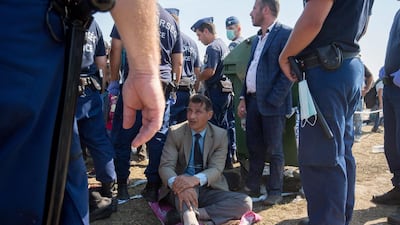Sometimes in US politics, even a win is a loss.
On January 20, the US Senate narrowly defeated a measure that would have halted all resettlement of Syrians and required top officials to certify each and every refugee entering the United States as not a “security threat".
But the motion, which at 55 votes fell short of the filibuster-breaking 60 needed from passage, was far from a victory. It instead marked the latest, loudest instance of shrugging off its responsibilities.
No matter how heated the rhetoric gets, don’t believe the bluster. The US isn’t at risk of taking in too many Syrians. It is at risk of taking in too few.
Since the outbreak of the Syrian crisis in 2011, the US has opened its borders to 2,712 Syrians, according to the State Department – barely a speck compared to the 1 million taken in by Europe or the 1.5 million by the staunch US ally, Jordan.
Since the Paris attacks in November – which the political right has tried to tie to refugees – the US has resettled a mere 540 Syrians. Since the December San Bernardino shooting, a turning point in the US debate on refugees, the US has taken in 375.
Even if the country lives up to president Barack Obama’s controversial pledge to take in 10,000 Syrians over the next year, the number would pale in comparison to the 70,000 refugees and 25,000 asylum seekers who came to the US last year alone.
American politicians’ attempts to turn back Syrians fleeing war and starvation are misguided.
Analysts and simple maths debunk claims that Syrians pose a security threat.
According to the US State Department, 2 per cent of Syrians admitted to the US are “military age males", between the ages of 18 and 30. Nearly half of Syrians, 44 per cent, are under 14.
The vast majority, about 75 per cent, are women and children.
Even those US politicians who fear Syrian orphans should rest easy. Syrians undergo an intensive, multilayered vetting process before even being considered for resettlement to the United States.
First, tens of thousands of Syrians are screened by local authorities in Jordan, Lebanon and Turkey and then by the United Nations’ refugee agency before being allowed to enter host countries and refugee camps.
The UN once again screens Syrians for resettlement and humanitarian need. Shortlisted Syrians – the UN approved 23,000 out of 4 million for US resettlement last year – then must undergo a battery of background checks and interviews by US officials and agencies. The State Department, the FBI, Homeland Security and the National Counterterrorism Center – all have their say on who can finally enter the US. It is a process that takes up to two years.
But there is a pressing need for the US to live up to its humanitarian responsibility.
Hating and fearing immigrants is becoming the vogue on the US political scene. Europe is taking note. By tightening restrictions, the US would set a precedent for European countries that have taken in over a million Syrians and are reaching the political limits of their hospitality.
In Sweden, the record influx of 190,000 refugees in 2015 saw the rapid rise of Sweden Democrats – the nationalist, anti-immigrant group with neo-Nazi roots, which now polls at between 17 per cent and 28 per cent.
Questions of integration and recent attacks carried out by men of North African descent have swung the dynamic in Germany – which once opened its arms to Syrians – and has mobilised the far-right.
Once a fringe group, the far-right, anti-immigrant Alternative for Germany party has seen its popularity soar to 11 per cent, according to recent polls. If elections were held today, it would become the third-largest party in Germany.
The tide is also turning in Denmark. On January 26, Danish legislators overwhelmingly approved a so-called “jewellery bill”, a law giving the Danish government the right to seize any valuables on refugees worth over $1,400 (Dh5,100).
Even more troubling, a hidden clause in the bill raises the waiting period for refugees to reunite with relatives, spouses and children outside Denmark to three years.
All signs indicate that Europe will not allow the mass influxes of asylum seekers that continue to flood its shores. A “complete shutdown of Muslims entering” the country, surveillance of mosques, “retroactive assessment of refugees” are all policies that would feel right at home in far-right European manifestos.
But these are not the words of the ideological descendants of Nazi nationalism. These are the front-runners for the US presidential elections.
In Donald Trump, Ted Cruz and their supporters, these far-right European movements do not only see kindred politics. They see kindred spirits.
A US that turns its back on Syrians not only condones Europe’s plunge into far-right, anti-immigration politics, but it also practically pushes it into the abyss.
Rather than mainstreaming the hatred and fear that is creeping into the West, the US must beat it back.
The world, and an increasingly tense Europe, is watching.
Taylor Luck is a political analyst and journalist in Amman

